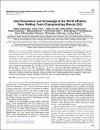Heat Preparation and Knowledge at the World Athletics Race Walking Team Championships Muscat 2022

View/
Date
2023-06-06Author
Galan-Lopez, NataliaEsh, Chris J.
Leal, Diogo Vaz
Gandini, Silvia
Lucas, Ronan
Garrandes, Frederic
Bermon, Stephane
Adami, Paolo Emilio
Kajeniene, Alma
Hosokawa, Yuri
Chrismas, Bryna Catherine Rose
Stevens, Christopher J.
Taylor, Lee
...show more authors ...show less authors
Metadata
Show full item recordAbstract
Purpose: To assess elite racewalkers’ preparation strategies, knowledge, and general practices for competition in the heat and their health status during the World Athletics Race Walking Teams Championships (WRW) Muscat 2022. Methods: Sixty-six elite racewalkers (male: n = 42; mean age = 25.8 y) completed an online survey prior to WRW Muscat 2022. Athletes were grouped by sex (males vs females) and climate (self-reported) they live/trained in (hot vs temperate/cold), with differences/ relationships between groups assessed. Relationships between ranking (medalist/top 10 vs nonmedalist/nontop 10) and precompetition use of heat acclimation/acclimatization (HA) were assessed. Results: All surveyed medalists (n = 4) implemented, and top 10 finishers were more likely to report using (P = .049; OR = 0.25; 95% CI, 0.06%–1%), HA before the championships. Forty-three percent of athletes did not complete specific HA training. Females (8% [males 31%]) were less likely to have measured core temperature (P = .049; OR = 0.2; 95% CI, 0.041–0.99) and more likely to not know expected conditions in Muscat (42% vs 14%; P = .016; OR = 4.3; 95% CI, 1%–14%) or what wet bulb globe temperature is (83% vs 55%; P = .024; OR = 4.1; 95% CI, 1%–14%). Conclusions: Athletes who implemented HA before the championships tended to place better than those who did not. Forty-three percent of athletes did not prepare for the expected hot conditions at the WRW Muscat 2022, primarily attributed to challenges in accessing and/or cost of equipment/facilities for HA strategies. Further efforts to bridge the gap between research and practice in this elite sport are needed, particularly in female athletes.
Collections
- Physical Education [138 items ]

